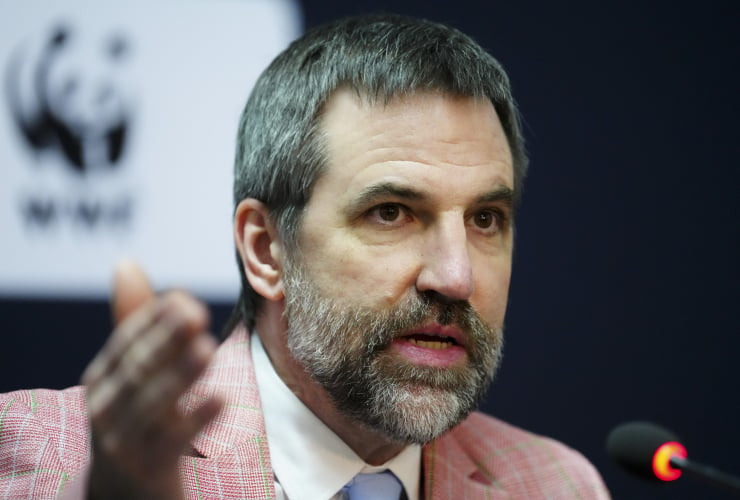Support journalism that lights the way through the climate crisis
Finance and environmental experts say Finance Canada is undermining sustainable investment with a multi-year effort to include fossil fuels in guidelines intended to help capital flow to clean alternatives.
The guidelines would be Canada’s forthcoming sustainable finance taxonomy — a classification system that defines what types of investments count as “green” or “transition-related.” Budget 2024 confirmed Ottawa will provide an update sometime this year, but failed to offer any details about what the taxonomy might include or specific publication timelines.
A taxonomy does not restrict funding for fossil fuel projects. It simply defines what counts as sustainable and what doesn’t in order to allow sustainable projects to receive better financial terms as banks increasingly earmark capital for clean projects. For climate advocates, tipping the business case toward renewables and away from fossil fuels by using a taxonomy is a crucial missing piece in Canada’s climate strategy.
In mid-April, more than 55 climate groups wrote to Finance Minister Chrystia Freeland, Environment and Climate Change Minister Steven Guilbeault, and Energy and Natural Resources Minister Jonathan Wilkinson urging them to rule out including fossil fuels in the taxonomy.
“There should only be a Canadian taxonomy if it credibly aligns with the overarching goals of the Paris Agreement,” the letter reads. The Paris Agreement is an internationally binding treaty Canada has signed that aims to hold global warming to 1.5 C and no more than 2 C. To do that, scientists say burning fossil fuels must be rapidly phased out.
“To align with the global scientific consensus of what is required from Canada on climate action, Canada’s taxonomy must exclude any expansion of oil or gas production, as well as any carbon capture related to these sectors,” the letter adds.
As previously reported by Canada’s National Observer, confidential documents revealed carbon capture technology for oilsands production was included in early recommendations to the federal government.
Experts say that if coal, oil or natural gas are included in the taxonomy, it won’t be seen as credible by investors and would ultimately harm Canada’s ability to attract capital for clean energy projects.
But Freeland isn’t ruling fossil fuels out. When asked if fossil fuels are being considered in the taxonomy, Freeland’s press secretary Katherine Cuplinskas dodged the question.
“The government is working on the taxonomy, alongside many partners, to complete the process as quickly as possible,” Cuplinskas said. “We will provide an update on the development of a Canadian taxonomy later this year.”
When asked to clarify if Freeland was considering including any fossil fuels in the taxonomy, Cuplinskas stopped replying to Canada’s National Observer.
“Experts have been saying for a long time you can't have a credible taxonomy that would include investment in fossil fuels, particularly expansion fossil fuels like [liquified natural gas (LNG)],” said Adam Scott, executive director of Shift: Action for Planet Wealth and Planet Health, a climate finance advocacy group. “So it's very confusing as to why Finance is still pushing this forward and being unclear on this.”
The fossil fuel industry has long argued that liquified natural gas can serve as a transition fuel for some countries still reliant on burning coal for electricity generation. If a Canadian taxonomy defines LNG as a “transition” fuel, it’s expected LNG companies would be able to ink deals on better terms with banks, potentially tipping the scales toward further fossil fuel investment.
But LNG is anything but sustainable. It is a fossil fuel made up mostly of methane — a potent greenhouse gas that is a top priority for emissions reductions. Over a 20-year period, methane is about 80 times more powerful than carbon dioxide at trapping heat in the atmosphere.
“Another key issue with LNG projects is that they are hugely capital-intensive and thus, usually predicated on being utilized for decades to come,” explained Mike Coffin, think tank Carbon Tracker’s head of oil, gas and mining. “New [fossil fuel] developments further lock society into the continued use of fossil fuels over the long term, even as rapid renewables weakens demand.
“For many countries, pivoting directly from coal- to renewables-based electricity is both financially advantageous, as well as having a climate benefit.”
Scott says he’s disturbed by evidence of oil and gas lobbying of Finance Canada officials aimed at greenwashing the taxonomy by including fossil fuels.
“The whole point of a taxonomy is to eliminate greenwashing, and Freeland's office seems hell-bent on doing the opposite,” he said.
Although it is not known what exactly was discussed, according to the federal lobbyist registry, over the past year, scores of meetings have been recorded between Finance Canada officials and companies and industry groups pushing the government to embrace increased fossil fuel extraction, including Canadian Natural Resources, Cedar LNG, the Canadian Gas Association and others.
“The minister of finance owes Canadians a green and stable financial system that is aligned with climate action,” Julie Segal, Environmental Defence senior manager for climate finance, told Canada’s National Observer. “Over three-quarters of Canadians want rules from the government that clear up greenwashing from banks and other companies.
“But the progress on delivering a sustainable finance-labelling system has been incredibly slow, and whether the next steps will result in a credible label is still unclear,” she said.
Years of delay
In last year’s fall economic statement, Finance Canada disclosed it was earmarking $1.5 million to develop its sustainable finance taxonomy. It is not clear how exactly that money is being used, but Finance Canada says the work will be supported by “external technical experts.”
But that announcement is not a sign that Finance Canada is leading the charge; rather, it's picking up the pieces after two previous attempts collapsed.
In 2018, Ottawa created an expert panel group to advise how the country could move to a cleaner economy. The panel’s 2019 report recommended a taxonomy that was never developed.
Then in 2021, the federal government launched its Sustainable Finance Action Council (SFAC), a 25-member group composed of banking, insurance and pension fund representatives. No civil society groups, climate experts or Indigenous organizations were included.
SFAC was tasked with providing recommendations to government about what should be included in a taxonomy. Those recommendations were delivered in 2022, and have since appeared to gather dust on Freeland’s desk.
SFAC’s mandate expired in March without accomplishing much. In the days after the group folded, its chair Kathy Bardswick, former CEO of the Co-operators Group, told the Globe and Mail it was frustrating for the members to have little interaction with government, even after government tasked it with providing recommendations.
In November, Mark Carney, UN special envoy on climate action and finance and former governor of the Bank of Canada, told attendees at an Ottawa sustainable finance meeting that Finance Canada had been provided with an excellent road map from the SFAC for how to develop a taxonomy. But he then appeared to take a shot across Freeland’s bow saying: “We need someone to drive the car.”
After six years and two expert panels, Finance Canada is now taking over writing the taxonomy.
“So, third time's the charm,” Scott sarcastically said. “Are we going to continue this silly process of when the industry doesn't get the answer it wants, we're not going to move ahead?
“Certainly, Finance is causing damage here by continuing to not move forward on the taxonomy,” he said. “Canada is falling further behind.”
Updates and corrections
| Corrections policyAn earlier version of this story referred to Kathy Bardswick as the CEO of the Co-operators Groups. She is in fact the former CEO.
I believe Climate change is
I believe Climate change is real And a threat to humans. The nay sayers get the press. However, fossil fuels power the world and our electricity fired life style here in a developed country where Canadian people are in the top ten per capita for CO2. They cannot and won't disappear immediately. Then there is plastic! What to do. So investing in reducing FF emissions makes sense, especially in Alberta which just killed wind and solar power . The USA Koch Brother's and major oil companies spend billions denying Climate change so what to do? Any ideas folks






Comments